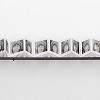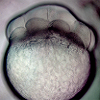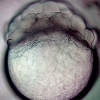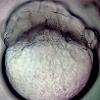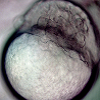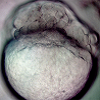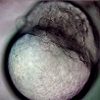ASKXXI: Arts and Science Knowledge Building in the XXI Century
Residency and Exhibition 2018-2019
Sponsored by US Embassy, Santiago Chile Public Affairs Grant ASKXXI: Arts and Science
Knowledge Building in the XXI Century Art and Science Residency, Friday Harbor Marine Biology
Research Station, Friday Harbor, Washington.
Work in Exhibition
GESTATION
Documenting the Gestation of Fish Eggs as Water Temperatures Rise, 2019
Zebra Fish Egg photographed with The Nikon Eclipse Ti-E inverted microscope for epi-fluorescent imaging and a digital camera for high resolution image acquisition of critical moments in the stages of embryonic development, 2- cell, 4 cell, 8-cell, 16-cell, 32-cell, 64-cell, 128-cell, morula, late blastula, early gastrula, mid-gastrula, late gastrula, blastopore closure of the Zebra fish egg.
Photos Printed on Silk
Archival board frames
Plexi Case
18.5’ x 5”
The embryonic formation of an animal’s body is genetically coded and environmentally influenced. The genetic coding is not simple. Animals do not directly inherit all qualities, but through the combination of the parent genetics, epigenetics, and environmental factors, gestation begins.
My Interest in both human and animal gestation is both personal and political. As our environment becomes more polluted and warmer, we are seeing an array of genetic anomalies in all species (both human and animal). Additionally, because we can now do early genetic testing and selection, very difficult ethical questions arise.
In field studies by the National Oceanic Atmospheric Agency over the last 20 years, the temperature has been found to have risen quite high in rivers where salmon lay eggs. Data from field studies in the Sacramento River indicated that in some years (2014 and 2015 in particular) temperature-related mortality has exceeded 75 percent.
A final short film Gestation depicts egg gestation through to the blastocyst stage. The film was made in Professor Kara Chenery’s developmental biology lab at Reed College using The Nikon Eclipse Ti-E inverted microscope for epi-fluorescent imaging and a digital camera for high resolution image acquisition. The camera was programmed to record an image every five minutes over eight hours. Zebrafish embryos were used, as they are transparent, develop outside of the mother, and are amenable to genetic and embryological manipulations.
From the film I captured still images of the critical moments in the stages of embryonic development, 2- cell, 4 cell, 8-cell, 16-cell, 32-cell, 64-cell, 128-cell, morula, late blastula, early gastrula, mid-gastrula, late gastrula, and blastopore closure. I printed these images onto silk to make a 32-page,18.5’ x 5” limited-edition accordion book entitled Gestation. The images of the zebrafish eggs are printed onto translucent silk. Each page is mounted into a frame.
Gestation was shown in the ASKXXI: Arts and Science Knowledge Building and Sharing in the XXI Century at the Universidad Catolica de la Santísima Concepción, CIBAS, Chile and the Bienal Concepción, Arte & Ciencia, Universidad Catolica de la Santísima Concepción, Chile.
ASKXXI: Arts and Science Knowledge Building and Sharing in the XXI Century is an interhemispheric community of scientists, artists, designers, and communicators forging new methods of virtual collaboration, visualization and co-creation that engage new audiences interested in the natural world, its diversity and conservation. The program, founded in 2017, created immersive travel, cultural exchange, and a field lab. http://www.askxxi.com
EXHIBITION
RETICULA: ECOLOGY AND ART REIMAGINED FOR THE XXI CENTURY
Reticula, an exhibition featuring the interdisciplinary artwork of the inaugural Chile-US team of ASKXXI - Art + Science Knowledge Building and Sharing in the XXI Century opens on March 15th, 7:30PM at the Universidad Católica de la Santísima Concepción’s Gallery, in Concepcion.
Reticula pertains to the network structures manifested in the natural world. For this community of artists and scientists, Reticula is the experience of building open, creative knowledge networks and cultural ecosystems in the service of global earth stewardship.
The works exhibited seek to inspire inquiry and raise ecological awareness, covering a range of themes and media, always with an emphasis on observation, inquiry, and process. In terms of ecology, it covers topics ranging from diving into the depths of pollen research, to bringing back a threatened fish species, to the anthropocene, to different perceptions of time inferred from old growth. Seventeenth Century curiosity cabinets, weaving, knitting, and virtual reality, are some of the media used.
US and Chile Artist featured in Retícula:
Chile: Marianela Camano, Javiera Constanza, Belen Gallardo, Nicole Garcia, Miguel Bolt Kalfon, Thomas Kramer, Fernanda Oyarzun, José Manuel de la Parra, Cecelia Toro
US: Jeff Brice, Jack DeLap, Nathan DiPietro, Rebecca Cummins, Geraldine Ondrizek, Siddharth Ramakrishnan, Ginny Ruffner, Scott Sutton, Kristin Tollefson, Genevieve Tremblay
ASKXXI is an international art-science program founded in 2017 by a Chile-US team of female scientists and artists, Fernanda Oyarzun (UCSC), Genevieve Tremblay (CMU ‘80, independent artist, curator and public scholar, Microsoft Innovative Educator), Belen Gallardo (IEB) and Nelida Pohl (IEB). It promotes interdisciplinary collaboration and innovation in arts, education, and science communication, putting forth the value and functions of the marine and terrestrial ecosystems of Chile and the Pacific Northwest of the US, and the challenges they face.
The pilot program (2018-19) was funded in part by the US Embassy in Chile, in partnership with the IEB and UCSC. Ten inaugural Chilean fellows, Beatriz Buttazzoni, Fernando Mejías Baeza, Marianela Camano, Javiera Constanzo, Nicole Garcia, Miguel Bolt Kalfon, Thomas Kramer, José Manuel de la Parra, Pablo Savario and Marcelo Velasco were selected to engage in an interhemispheric experience. Led by international founding faculty team, Belen Gallardo, Fernanda Oyarzun, Nelida Pohl, Genevieve Tremblay, they visited biological stations, protected areas, top hi-tech companies, universities, labs and artist studios in Washington State and Southern Chile, in an effort to fully immerse themselves in natural places and the people who study them: scientists and artists. In Chile the participants visited research stations and universities in northern Patagonia (Melimoyu, Fundación Meri), Chiloé Island (Senda Darwin Biological Station, IEB-PUC), Puerto Montt (Centro iMar, ULA) and Concepción (UCSC, Lenga Biological Station, UDEC), where they conducted workshops and field research, and learned about the ecology of southern waters and forests. The US trip provided opportunities to learn state-of-the-art methods of 3D imaging, illustration, virtual/augmented reality, and data visualization, and provide access to artists from the Pacific Northwest who integrate these emerging technologies into their art-science practice. In addition, the 2018 ASKXXI Certificate Diploma program was hosted by the Faculty of Sciences, Center for Research in Biodiversity and Sustainable Environments (CIBAS) and the Faculty of Medicine, UCSC.
The consortium of ASKXXI academic and research pilot partners in Chile and the US includes: Senda Darwin Biological Station, Instituto de Ecología y Biodiversidad, Universidad Católica de la Santísima Concepción (CIBAS, Bi-lab Interactive Biology Lab), Centro i~mar (Universidad de Los Lagos), Melimoyu Nature Reserve (Fundación Meri), University of Washington (Friday Harbor Laboratories, UW Data Lab, Bothell Campus) Cornish College of the Arts, Reed College, University of Puget Sound, Microsoft Research. Additional industry and cultural partners include Pixvana, AltspaceVR, Schema Design, Gist, GoMicro, Burke Museum, EV Nautilus, UW Bothell Herbarium, Pacific Science Center, Burke Museum, Slater Museum, Ballard Locks, iPhone Labs, Fearless 360, Sliprabbit Studio, Ginny Ruffner Studios, and Ian Boyden Studios.

